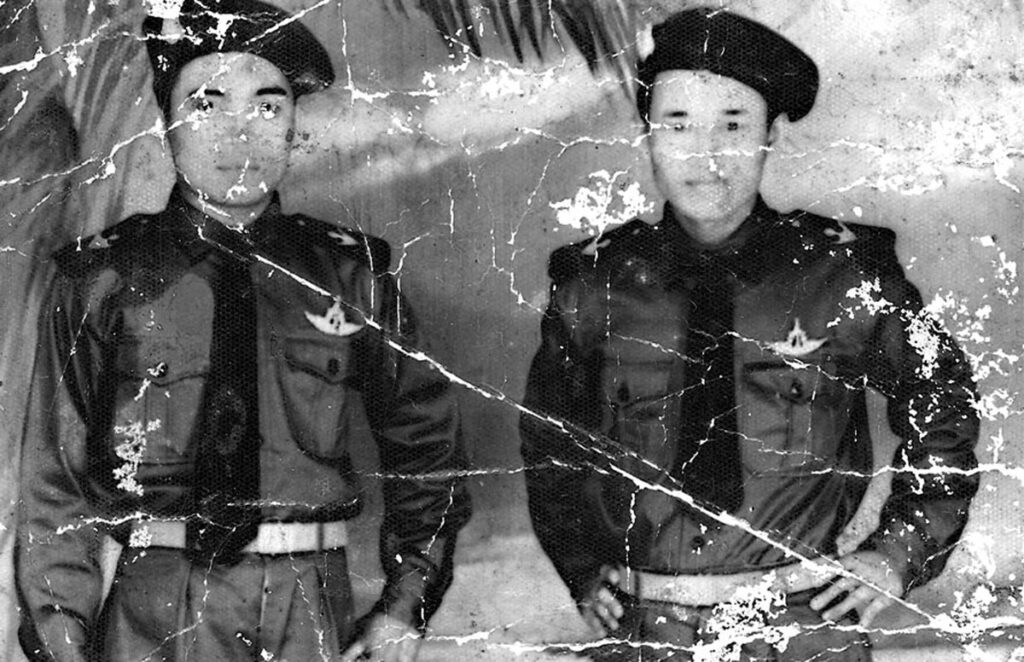My husband worked for the civil aviation administration at Pochentong Airport when we met. He was responsible for security at the airport at a time when people were trying to burn it down.
Moeun was much more educated than I. He could speak English and French fluently, as well as Chinese because he was half Chinese and half Vietnamese. After we got married, we built a house near Moeun’s office.
Moeun could earn only 400 riel a month from his job at the airport, so he had to force himself to steal fuel and sell it so we would have enough money to support the family. One day in 1960, he decided he didn’t want to work in civil aviation any longer and volunteered for the military to fight the Khmer Rouge. Each time he went to the battlefield, he took my children and me along with him. My oldest son cannot read or write today because he was always with his father and unable to attend school. Sometimes, I was acted as my husband’s guard so that he could get some sleep.
In 1973, he resigned and went to work as a driver instead. He also fixed cars. But a short while later, he went back being a soldier again. When he was transferred to the Vaing Katt military office, I came along with him, even though I was ready to give birth to my fourth child. On the day he was being sent to Vietnam to study military tactics, I had a miscarriage, so he took me to the hospital and stayed with me until I recovered.
In 1975, the Khmer Rouge soldiers evacuated all of my family from the Phnom Penh military barracks. I packed my husband’s military uniform, but then threw it out on the street because I was afraid the Khmer Rouge would find it. We headed to Takeo Province, where my mother and other relatives were base people.
However, when we arrived, the Angkar did not allow us to talk with each other because we were new people, and the villagers did not welcome us. Then we were sent to another village far from my hometown where we were made to destroy schools and pagodas, and to dig graves for the Chinese. My husband was ordered to climb palm trees in order to bring down their juice and make ropes. Although these tasks were new to him, he worked very hard to avoid accusations that he was a capitalist.
Each night, around 15 ox carts came to the village and took people away. The Angkar said they were being sent for re-education, but they were killed. I know this because some of their belongings and clothes were brought back to the village. Most of the people taken away were second lieutenants or higher. I asked why I was not taken; the Angkar said they would keep me for a while and then I would be re-educated.
At the end of 1975, we were sent to Battambang Province where we lived only with other April 17 people. We build a shelter of bamboo and found that our lives were not so difficult as before. We had a little time for relaxation and could listen to traditional songs during the Khmer New Year. My husband continued working as a palm tree climber and I was sent to work in the rice mill.
The Angkar found a handful of rice hidden in my shirt pocket one day. I didn’t know it was there; my daughter put the rice into my pocket when she was playing. They held me in that old rice mill for a whole day, but luckily, they released me.
The Vietnamese soldiers liberated Cambodia in 1979 and my family ran away from the cooperative. We moved to Siem Reap Province for a short while. As I was pregnant with my fifth child, my husband decided to swim across a lake so he could trade for food. It was quite dangerous for him because he had to carry a trunk to hold the food, but he always did these things for his family. Then we returned to Moeun’s hometown. We had no more rice to eat so we exchanged our gold to get scarves. Then, we exchanged the scarves for food.

